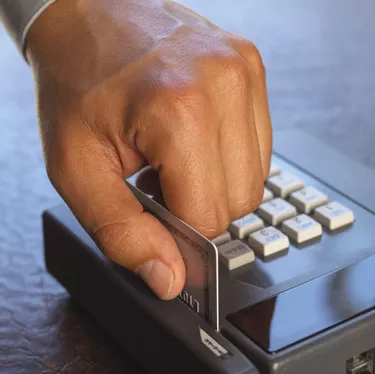
Banks have programs that are designed to prevent debit and credit card fraud by unscrupulous merchants. When merchants fail to deliver a product or service that they already charged to a debit card a consumer can complain to her financial institution, which can then reverse the charge. However, while banks take the protection and security of their customers seriously, they also don't want customers abusing the system. Charge reversals require specific criteria and usually a brief investigation to ensure that requests are fair and legitimate.
Legitimate Reasons
Video of the Day
Banks require customers to have legitimate cause for a charge reversal. This can be difficult to define when it comes to dissatisfaction with services. However, as a general rule, gross negligence or failing to complete a requisite task indicates that a merchant didn't deliver a promised service. For example, a cleaning service that showed up late, stayed for only one out of four promised hours and left the premises mostly uncleaned didn't fulfill its obligation. Similarly, an auto mechanic who didn't successfully repair a vehicle most likely didn't deliver the service he should have.
Video of the Day
Nonqualifying Situations
Bank customers have to weigh a merchant's performance carefully before requesting a charge reversal. Customers who complain wrongfully and abuse the system may have trouble getting help from their bank when a situation that legitimately calls for a reversal arises. Being dissatisfied with an attitude or customer service skills alone doesn't make a legitimate claim. For example, a customer upset by an auto mechanic who was rude, took longer than promised to complete work and charged high rates may have real gripes, but does not qualify for a charge reversal. In the end, the mechanic completed the work and the customer agreed to the rates, making the transaction legal and valid.
Investigations
To avoid lawsuits and government scrutiny, banks need to carefully document debit card charge reversals. Although a bank may want to champion its customer's cause, it has to have proof that a merchant didn't deliver proper service. Therefore, banks will often ask customers to make written statements and provide any receipts or documentation that supports their story. Additionally, banks may contact merchants and their banks to collect their statements before making a final decision on a charge reversal.
Alternatives
Banks have limited parameters for reversing charges. Just because a bank doesn't have enough grounds to reverse a charge doesn't mean a customer doesn't have a legitimate gripe. Instead of turning to a bank for a charge reversal, consumers can contact their state attorney general's office or the Better Business Bureau to report poor business practices. Additionally, consumers can file lawsuits -- including small claims -- against offending businesses.